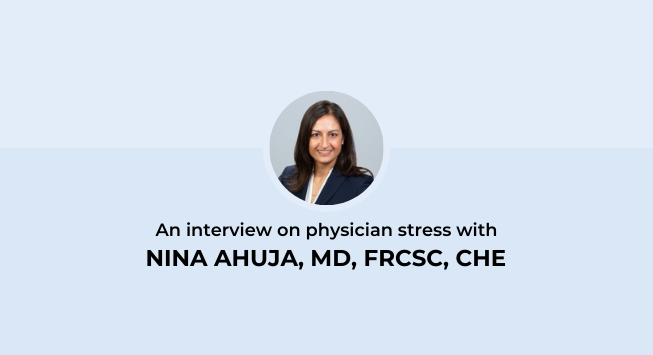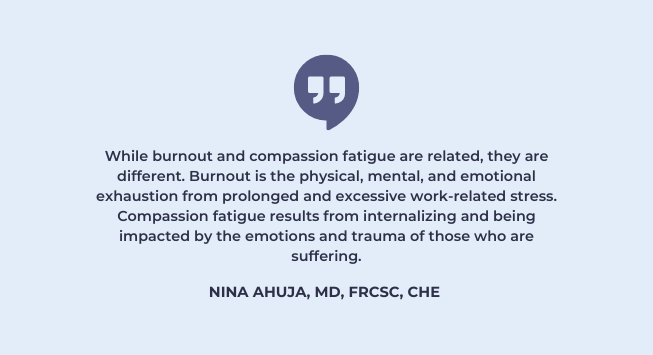How To Identify and Deal With Compassion Fatigue During a Pandemic

When we think about compassion fatigue, we often correlate it with physician burnout. The truth, though, is that the two are quite different. We talked with Dr. Nina Ahuja—author of Stress in Medicine: Lessons Learned Through My Years as a Surgeon, from Med School to Residency, and Beyond and Founder of Docs in Leadership—to discover the difference between the two, her insight into compassion fatigue during the pandemic, and her tangible advice for doctors who are feeling compassion fatigue and burnout during this time of extreme stress.
What Is the Difference Between Compassion Fatigue and Burnout?

Dr. Nina Ahuja on the differences between compassion fatigue and physician burnout
Physician burnout is described as a loss of enthusiasm for your work, and an increase in detachment, emotional exhaustion, and cynicism. Compassion fatigue is absorbing the emotional trauma and stress of your patients, creating secondary trauma and stress. If you’re suffering from compassion fatigue, you might feel increased emotional exhaustion, depersonalization, and inequity in your relationships with patients.
Here’s the Problem With Compassion Fatigue
The reason healthcare providers get compassion fatigue is the same reason we enter into the profession in the first place—we want to help people, and we care immensely. To take that even further, when doctors take the Hippocratic Oath, we submit to providing care that’s compassionate; compassionate care is also a key to patient satisfaction—so how do you put a boundary on that compassion? How do you fight compassion fatigue when it seems like you’re doomed to get it?
.png?width=653&name=Compassion%20fatigue%20blog%20images%20(13).png)
Dr. Nina Ahuja on why physicians feel more stress than other medical professions
The State of Compassion Fatigue During the COVID-19 Pandemic
At the beginning of the pandemic, healthcare providers on the front lines reported less instances of compassion fatigue than the rest of the HCP population. The study theorizes that all of the front line workers were placing all of their focus on achieving outcomes for patients, so compassion and fatigue and burnout were a non-factor.
However, as the pandemic stretched on, healthcare providers report experiencing burnout at higher and higher rates. In November—9 months into the pandemic—healthcare professionals working in COVID-19 “contagion areas” reported higher levels of stress and lower levels of compassion satisfaction.
In Dr. Ahuja’s case, she’s not necessarily on the front lines. However, through developing her book, she has spent countless hours talking to doctors who are. As an Academic Division Head for Ophthalmology at McMaster University, Dr. Ahuja has helped medical students and residents navigate this crazy time in their training.
As Academic Division Head for Ophthalmology at McMaster University, Dr. Ahuja has helped medical students and residents navigate this crazy time in their training. She also faced her own stresses as her surgical practice was mandated to close during the first wave in accordance with public health and government orders—leading to hundreds of cancellations of assessments and surgical procedures. Patients were extremely upset and anxious as their vision continued to deteriorate, impacted their ability to drive, and for some, their ability to live independently. Meanwhile the backlog of patients continued to build, with difficult decision to be made for the operations of her private practice.
For those working in ICUs, emergency departments, and long-term care facilities, the risk for compassion fatigue is extremely high. Its psychological impacts are significant and potentially long-lasting. Dealing with patients who are becoming sicker each day, having to decide which patients will have access to limited resources, the mental and physical exhaustion of the work, and the emotional toll of these situations.
For providers of more elective care, burnout is a significant concern. Making up for the sheer volume of cancelled appointments and surgical backlogs, continually restructuring practices to accommodate public health recommendations and guidelines that often change at a moment’s notice, managing patients who are anxiously awaiting medical or surgical care, along with others who are afraid to seek care but really need it. Add to that adapting to virtual care delivery where you can, and for those who own their own practice, managing the human resource and economic impacts of mandated closures and slowdowns.
Physician wellness has been an ongoing concern. The pandemic has magnified the issue and brought it to the forefront, along with additional complexities.
— Nina Ahuja, MD, FRCSC, CHE
What To Do if You Think You Have Compassion Fatigue
Ask yourself the following questions: Are you feeling an increase in the intensity of your emotions? Do you notice a decrease in cognitive ability, or impaired judgement? Are you feeling isolated? Is your morale lower than normal? If you answer yes to any of these questions, you might have compassion fatigue.
And you’re not alone. Thousands of healthcare professionals are facing extreme stress that takes a toll on their emotional state—which has been exacerbated by the pandemic. Admitting (even if only to yourself) that you are feeling compassion fatigue doesn’t mean you care less about your patients.
If you’re feeling like you might be feeling compassion fatigue, start by checking in with yourself: what do you do daily to relieve stress? Are there any activities you enjoyed previously, but just don’t seem to have the time for lately? Try to work those stress-relieving activities back into your routine. Not being able to release stress after work is a big indicator of compassion fatigue, so find new ways to make these “stress relievers” a focus in your life.
Dr. Ahuja’s ADMIT Framework for Physician Stress
You can also try this tip from Dr. Ahuja’s book: use her ADMIT framework to pull yourself away from stress and into a pattern of positivity.
.png?width=653&name=Compassion%20fatigue%20blog%20images%20(4).png) The common theme between all of the phases within Dr. Ahuja’s ADMIT framework is the fact that it's really supporting the development of a growth mindset. It’s about taking a bad situation and reframing it into something positive.
The common theme between all of the phases within Dr. Ahuja’s ADMIT framework is the fact that it's really supporting the development of a growth mindset. It’s about taking a bad situation and reframing it into something positive.
For example, as the pandemic has continued, many physicians have had to transition to virtual care in an expedited manner. Transitioning to virtual anything can be intimidating in the best of times, let alone during a pandemic. As much stress as you may be feeling, if you can find even one reason to connect with the impending change - whether that be the opportunity to tackle your backlog of patients, or simply being able to resume patient care—adapting to this new way can become less stressful by identifying benefits that are meaningful to you.
— Nina Ahuja, BScHons, MD, FRCSC, CHE
Each phase of her ADMIT framework goes through sample scenarios like this one, giving a great structure for reframing things in physicians’ lives that can be extremely stressful.
When it comes to the pandemic, it is easy to see how, in our current climate, compassion fatigue has run rampant among healthcare providers. How could we not feel compassion fatigue? How could we not take on the emotional toll that our patients are facing daily?
If you’re feeling burnout or compassion fatigue, a good first step for you might be to reframe your thinking about stressful events in your life. Read more about Dr. Ahuja’s own experiences as a surgeon and get details on her ADMIT framework in her book, Stress in Medicine: Lessons Learned Through My Years as a Surgeon, from Med School to Residency, and Beyond.
This is one in a series of blogs, Start From Within, where we’re tackling some of the ‘softer’ parts of being a doctor, ones that you weren't tested on in medical school: healthcare inequity, the elements of professionalism as a doctor, what to do when patients have a bias, understanding how compassion fatigue affects you and your colleagues during the pandemic, etc.
Our mission is to make learning medicine easier. But we know it’s not just how you learn medicine—the way you apply your knowledge in clinical settings is immensely important, too. This blog series is meant to help you navigate the patient situations you face daily and improve your patient care.
Join our community of 30,000+ physicians who get regular study tips, board prep advice, and get special offers on MedStudy tools.


